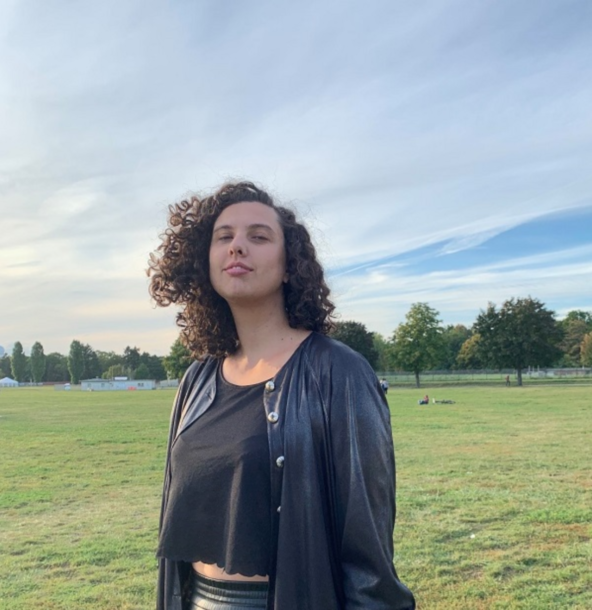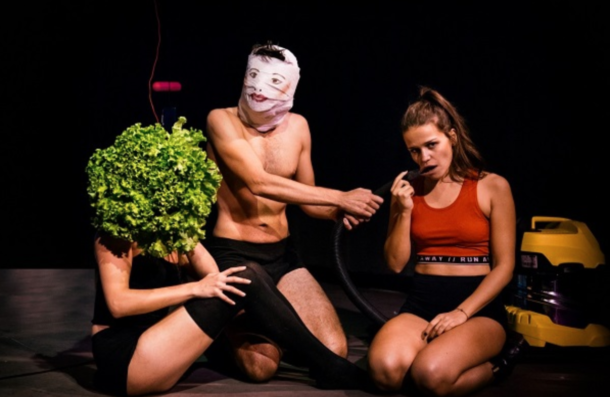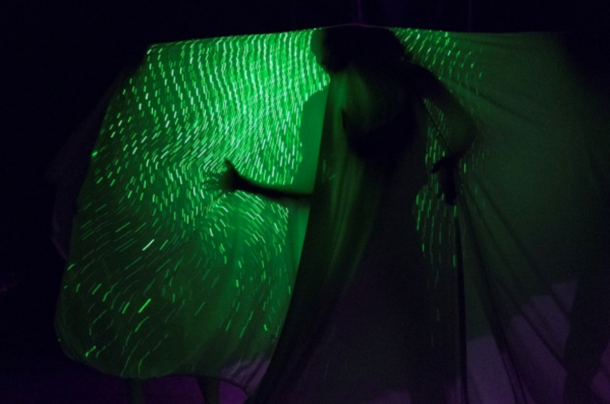
İrem Aydın. Photo: Tunay Altay.
İrem Aydın is one of the leading young voices of Turkish theatre and performance. She produces performative and poetic works trying to focus upon and to understand the tragedy of her age and generation. Her works mostly deal with the topics “migration,” “digitalization,” and “traumatic experiences.”
Born in Istanbul, Aydın studied Spanish Language and Literature at Istanbul University and attended the Master Program in Theater Creation at University Carlos III de Madrid in Spain. She wrote and directed plays such as Above the Ground Under the Clouds, TürkLand (an adaptation of Dilşad Budak’s autobiographic novel), and Golem at Entropi Sahne where she worked as artistic director and collaborated with independent collectives such as Artopia from North Macedonia and Mehrtyer from Germany for the projects “The Sheet” and “The Wedding.” She participated in festivals such as the MOT International Theater Festival, the International Forum at Theatertreffen, and the Interplay Young Playwrights Festival. Currently, she lives and works in Berlin and Istanbul.
In June 2019, I met her in Berlin and had a chance to talk about her works, new projects, and thoughts on theatre. I hope I can continue the same dialogue with other young and critical voices of Turkey.
Eylem Ejder: Irem, you are regarded as one of the leading young Turkish theatre directors and playwrights. You have been called the “the scream of the new generation” as well. How does this make you feel? Does it restrict or suppress you, or motivate you more? How do you define your own experience? Can you tell us a little bit about yourself and your relationship with theatre, directing, and playwriting?
İrem Aydın: First of all, I would like to thank you for the way you introduced me. And of course, none of this was intentional. However, first, as spectators, we always missed a feeling in common with friends and colleagues about most of the shows in the Istanbul theater scene. Because although our generation is usually referred to as being apolitical and superficial, as millennials, the things we have been going through considering the political climate of the country did not allow us to remain insensitive to the dark atmosphere surrounding us. In our fully digitalized world, we are challenging to the ancient methods of oppression and restriction and facing absurd actions such as the Wikipedia block in ‘The Information Age.’ And we know we have so much to say. But on stage, redundancy has always been a problem in translated plays by Western authors. So the first impulse, I would say, was creating our own texts. But that doesn’t mean that the text is the starting point of a performance. Usually, after deciding on a concept together with performers, we improvise by using our fears, weaknesses, and desires to develop certain mise en scenes. Then I try to write texts which can correspond to these feelings. Basically, we search for the moments on stage. The whole thing is so chaotic and fast that the moments are all we have. Moments to breath and scream. So I guess this is the connection with your description. We have to scream because no one is listening and the theatre helps us to hear each other. And it’s highly motivating when people say they feel like they are being heard after seeing the performances. That’s also how I relate myself to the theatre; through that dialogue and common feelings with each other. Of course, there are also not so enthusiastic reactions as well, but I never felt restricted or suppressed. On the contrary, trying something fresh always makes me feel liberated.
E.E: This notion of “moments to breath and scream” manifests itself through a slippery, cracked ground or “in between somewhere” as the titles of your performative works reflect: Above the Ground, Under the Clouds (Yerden Yukarı, Bulutların Altında) and Golem where a group of young people come together and reveal their online identities. What are the feelings, thoughts, fears, or passions that let you and your performers work in that way?
I.A: In both performances, there are strong attachments and associations to current social realities. For instance, Above the Ground Under the Clouds was the year after 2016, in which we witnessed so many attacks and explosions. I remember canceling meetings because of possible attacks or, as it was put in the text, leaving the subway even though it wasn’t my stop because of suspicion of a possible human bomb. And these are the things we all did at some point. That was the social reality where death was normalized as part of everyday life. And I believe we have all been going through this collective trauma for many years. Also, Golem is about massive immigration both internal and external. But I’m also interested in the ways in which we receive and transmit these tragedies and traumas. Because now it is quite the usual thing to read news about a death right under the sexy picture of a friend. It is like nothing is out of context anymore or everything is. So I would say I’m mostly interested in the digitalized perception of tragedy. How we are exposed to an overload of all kinds of images and how we position ourselves with online identities. Because through social media we also have this intimacy with violence from a certain distance, like watching the inside of a house with transparent walls. And all is happening incredibly fast. This also makes us numb to certain emotions. So when we get together we improvise to confront those feelings, search for a place where all the reference points are gone, and see what is happening to us. That’s why it is a moment to breathe. It is quite intense but that’s how we bring all those feelings to the surface.

Above the Ground Under the Clouds, written and staged by İrem Aydın at Tatavla Sahne, Istanbul. 2018-2019. Photo: Murat Dürüm.
E.E: That’s a good point. I think this feeling of non-gravity and numbness is common for a whole generation, not just for those in Turkey. It is also what I would like to underline in your works. Can we say all the fragmented elements in the performances—ranging from narrative and character to image and sound—arise from this spatial catastrophe? What do you think about the relationships between your theatrical or performative language and the existential and spatial boredom on stage?
I.A: Yes, it is like floating in the void and that is a universal feeling. And it is not possible to talk about definite spaces in these performances, neither characters or storyline, but it is more like an accumulation of moments with various senses and colors which is an attempt to find something to hold on to inside of that uncanny darkness. Also, we are already fragmented in our own realities through the ways we contact but I would say it is about the real contact on stage by using the mediators that actually cause us to forget that. Also, the conflict, which we are mostly used to seeing between characters, exists between virtual and actual, so the space itself becomes conflicted. We can also see objects becoming strong characters such as the broom in Above the Ground Under the Clouds or the sheet in Golem. Any of the elements can be triggering from time to time, but the approach is equally distant, and it is about seeing how they form something altogether.
E.E: We can also see how these objects—broom or sheet—become love and hate objects. In Above the Ground, while expecting the broom will vacuum the digital garbage on stage, it becomes the performers’ object of desire. Likewise, the sheet in Golem is something in which the performer comes into existence, both desiring to get inside of it as well as something which they desire to escape or get rid of.
I.A: Yes, I think it is about the constant transformation of things on stage—the transformation of objects, moments, performers, situations, feelings, and through segmentation and integration of these pieces turning the entire thing into a living thing.
E.E: You perceive the tragedy of this age through digitalization. But the same digital age which you criticize also gave the young generation an opportunity of being together, performing resistance, or making real “another possible world.” Gezi Occupy was the most palpable example of such experience. It would not have been possible without social media. What do you think about this dilemma?
I.A: I think the Gezi Park Protests is a great example of how we managed to turn social media into a tool for social and political action. Not only in terms of communication but also with iconic images, authentic humor, and performative functions. It is also a phenomenal fact for the capacity of our generation. But the connection was real with actual presence and it was a productive act by making as you said another world possible. However, on a daily basis, we are simply consumers with our addiction. Also, I don’t specifically aim at criticizing the digital age but it is more like an attempt to find real contact inside of it. Otherwise, I like the ambiguity and elusiveness it brings, and getting lost inside of that uncanniness is a fascinating playground for me.
E.E: And this fascinating and uncanny playground is your space of experience. It is full of trauma, uncertainty, violence, envy, egoism, apathy and thus, seems like a summary of our daily moods. Interestingly, your works are not insensitive at all, despite the insensitiveness of characters (if we can still refer to them as characters).
I.A: I think as audience members, our encounter with these insensitive ‘’characters’’ makes the work itself sensitive because it causes some certain level of confrontation. Also, I wouldn’t exclusively describe them as insensitive but rather realistic, because all the emotions you mentioned are embodied in them. That’s actually the main part of the improvisation process—to reveal those feelings not in terms of acting but more like reacting to some certain situations as performers. So we see them as fictionalized versions of themselves on stage. I think this might be the link that makes the spectator more connected and distant at the same time.

Golem, written and staged by İrem Aydın, 2019. Photo: Hüseyin Karataş.
E.E: Irem, you have been working in Germany. As you know, there is an ongoing debate on the so-called “New Wave” migration from Turkey to Germany by the younger generation. What do you think about it? How does it affect, shape, or restrict your recent and future works?
I.A: It has been a really interesting experience so far. Especially I have been observing and questioning the reasons behind why this recent migration from Turkey needs to separate itself from the previous one even by the name ‘’New Wave.” Maybe we can distinguish the motivations behind it, as first-generation migration has more economical concerns and “New Wave” has more social and political reasons. Yet eventually we all come from same part of the world especially from a Western perspective. This is a subject mentioned in TürkLand as well. So I’m not a fan of any kind of description to distance myself from already existing community here. Generations of people from Turkey have had a major role and are still working on developing diversity politics in Germany. It is through that door that we have some space today. This invisible obligation, pushing newcomers to explain themselves as being a well educated new generation, part of secular migration, is an unnecessary burden. I think no one wants to leave their home town unless they have a good reason. I mean we don’t have to prove anything to (subconsciously) be more likable. Also societies tend to question results rather than reasons so it is irresponsible to complain about the increasing number of immigrants rather than the situations forcing people to become immigrants. As a result, right-wing populism is rising everywhere and as a result of their politics, it causes more people to migrate. It is like an infinite loop.
Being in Germany is both restrictive and liberating workwise. Of course, it is not easy to work especially in theatre without your native language and the strict structures here recognize your existence by the definition of your identity rather than your artistic approach, but inside of that (given) space, you have freedom. Migration has always been one of the main topics of my works but it was through the point of view of someone staying behind. Now there will be a switch of perspective to someone who left, so this will definitely affect my future works.
E.E: It’s also interesting you put on stage Türkland, a young Turkish woman’s story of migration from Berlin to İstanbul, while others are telling the story in a reverse way. How did this idea come to you to stage Türkland, which is very different from your other works?
I.A: Türkland is a special project. When I started to think about moving to Germany, I met Dilşad Budak Sarıoğlu and read her autobiographical book in which she moves from Germany to Turkey. I was very impressed by the story. It was interesting to discover the background and experience of people from Turkey in Germany because there is a lack of knowledge about that in Turkey. So we decided to make a stage adaptation as a reading performance and with Dilşad herself performing on stage. It is completely text-based, the true story of a person that the audience can see right in front of them. It was also surprising for the audience in Turkey because I guess we realized how little we know about this subject. Also through the tour in Germany I realized how important it was to share this common experience because of the reaction of the audience in Germany. But what I really like about Türkland is the universal feeling of belonging that it can reach so anyone can find something for themselves in the story. Usually I don’t prefer to work text-based so I would say that can be the biggest difference between Türkland and other performances. However, I also like working with texts when they are inspirational and contain universal sense like Dilşad’s story.
E.E: Would you like to talk about your recent studies, new projects, performances in Europe or elsewhere?
I.A: There will be the second tour of Türkland in Germany between 15th-25th of November and we also have a couple of projects such as regular readings and new performances in 2020 together with MaviBlau. I have been writing a play in collaboration with the Neuro-Psychiatrisches Zentrum Riem in Munich where I interviewed patients with migration in their background. And Golem will also continue in Istanbul.
E.E: Thank you for this conversation, Irem.
Eylem Ejder is a Ph.D. candidate in the Department of Theatre at Ankara University, Turkey. She is a theatre critic, researcher based in Istanbul, the co-editor of the theatre magazine Oyun (Play) and co-founder of Feminist Çaba (Feminist Endeavor), a collaborative criticism and writing group between four women critics. Her Ph.D. studies are being supported by The Scientific and Technological Research Council of Turkey (TUBITAK) within the National Ph.D. Fellowship Programme. For more information about her works: https://ankara.academia.edu/EylemEjder and for her personal blog https://kritikeylem.wordpress.com/

European Stages, vol. 14, no. 1 (Fall 2019)
Editorial Board:
Marvin Carlson, Senior Editor, Founder
Krystyna Illakowicz, Co-Editor
Dominika Laster, Co-Editor
Kalina Stefanova, Co-Editor
Editorial Staff:
Stephen Cedars, Assistant Managing Editor
Dohyun Gracia Shin, Assistant Managing Editor
Advisory Board:
Joshua Abrams
Christopher Balme
Maria Delgado
Allen Kuharsky
Bryce Lease
Jennifer Parker-Starbuck
Magda Romańska
Laurence Senelick
Daniele Vianello
Phyllis Zatlin
Table of Contents:
- The 73rd Avignon Festival, July 4-23, 2019 : Odysseys, past, present and future by Philippa Wehle.
- Ibsen in London by Marvin Carlson.
- Report from London (November – December, 2018) by Dan Venning.
- It’s All in the Wrist: How Nina Conti Faces Off with Reality by Katy Houska.
- Staging Trauma: A Review of Bryony Kimmings’s I’m a Phoenix, Bitch by Rachel Anderson-Rabern.
- Difficult Pasts and Revivals: Madrid Theatre Summer 2019 by Maria M. Delgado.
- Cultural Diversity in the Kunstenfestivaldesarts (Brussels) 2019 by Manuel García Martínez.
- Tampere Theatre Festival: Progressing Society by Pirkko Koski.
- Nasza Klasa in Georgia by Mikheil Nishnianidze.
- Young and Critical Voices of Turkey I: “Theatre helps us to hear each other.” A Conversation with Irem Aydın by Eylem Ejder.
www.EuropeanStages.org
europeanstages@gc.cuny.edu
Martin E. Segal Theatre Center:
Frank Hentschker, Executive Director
Marvin Carlson, Director of Publications
©2019 by Martin E. Segal Theatre Center
The Graduate Center CUNY Graduate Center
365 Fifth Avenue
New York NY 10016
European Stages is a publication of the Martin E. Segal Theatre Center ©2019
Martin E. Segal Theatre Center:
Frank Hentschker, Executive Director
Marvin Carlson, Director of Publications
©2019 by Martin E. Segal Theatre Center
The Graduate Center CUNY Graduate Center
365 Fifth Avenue
New York NY 10016
European Stages is a publication of the Martin E. Segal Theatre Center ©2019



